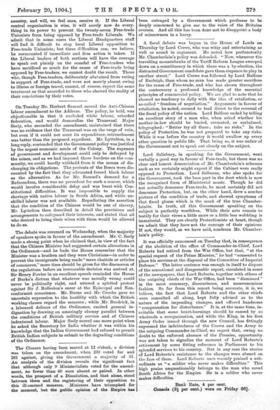On Tuesday Mr. Herbert Samuel moved the Anti-Chinese labour amendment
to the Address. The policy, he held, was objectionable in that it excluded white labour, retarded federation, and would demoralise the Transvaal. Major Seely, who seconded the amendment, maintained that there was no evidence that the Transvaal was on the verge of ruin, but even if it could not meet its expenditure, retrenchment was better than the proposed expedient. Mr. Lyttelton, in a long reply, contended that the Government policy was justified by the urgent economic needs of the Colony. The expenses of government and development could only be defrayed by the mines, and as we had imposed those burdens on the com- munity, we could hardly withhold from it the means of dis- charging its obligations. The protests of the Boers were dis- counted by the fact that they advocated forced black labour as the alternative. As for Mr. Samuel's demand for a Referendum, there was no precedent for such a course, which would involve considerable delay and was beset with Con- stitutional difficulties. It was impossible to supply the shortage with native labour in South Africa, and white un- skilled labour was not available. Repudiating the assertion that the condition of the Chinese would be one of slavery, Mr. Lyttelton then described in detail the provisions and arrangements to safeguard their interests, and stated that all who desired to bring their wives with them would be allowed to do so.










































 Previous page
Previous page